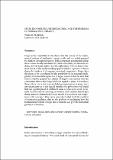Files in this item
Sense, incomplete understanding, and the problem of normative guidance
Item metadata
| dc.contributor.author | Pedriali, Walter B. | |
| dc.date.accessioned | 2018-06-01T23:32:38Z | |
| dc.date.available | 2018-06-01T23:32:38Z | |
| dc.date.issued | 2017 | |
| dc.identifier | 241731987 | |
| dc.identifier | 3ed6058c-3464-42d6-b954-403afd62e964 | |
| dc.identifier | 85045579189 | |
| dc.identifier.citation | Pedriali , W B 2017 , ' Sense, incomplete understanding, and the problem of normative guidance ' , Grazer Philosophische Studien , vol. 94 , no. 1-2 , pp. 1-37 . https://doi.org/10.1163/18756735-09303001 | en |
| dc.identifier.issn | 0165-9227 | |
| dc.identifier.uri | https://hdl.handle.net/10023/13674 | |
| dc.description.abstract | Frege seems committed to the thesis that the senses of the fundamental notions of arithmetic remain stable and are stably grasped by thinkers throughout history. Fully competent practitioners grasp those senses clearly and distinctly, while uncertain practitioners see them, the very same senses, “as if through a mist”. There is thus a common object of the understanding apprehended to a greater or lesser degree by thinkers of diverging conceptual competence. Frege takes the thesis to be a condition for the possibility of the rational intelligibility of mathematical practice. I argue however that the idea that senses could be grasped as a matter of degree is in tension with the constitutive theses that Frege held with regard to sense. Given those theses, there can in fact be no such thing as misty grasp of sense, since any uncertainty as to the logical features of a given sense will entail that one is getting hold of a different sense or of no sense at all. I consider various ways of resolving the tension and conclude that Frege’s thesis cannot be defended if we take it to be a thesis about our competence with concepts. This leaves unresolved what I call the problem of normative guidance, that is, the problem of explaining how the fundamental notions of logic and arithmetic can provide inferential guidance to thinkers. | |
| dc.format.extent | 193446 | |
| dc.language.iso | eng | |
| dc.relation.ispartof | Grazer Philosophische Studien | en |
| dc.rights | © Koninklijke Brill NV, Leiden, 2016.This work is made available online in accordance with the publisher’s policies. This is the author created, accepted version manuscript following peer review and may differ slightly from the final published version. The final published version of this work is available at https://dx.doi.org/10.1163/18756735-09304001 | en |
| dc.subject | Frege | en |
| dc.subject | Incomplete Understanding | en |
| dc.subject | Concepts | en |
| dc.subject | Burge | en |
| dc.subject | Normativity | en |
| dc.subject | Logic | en |
| dc.subject | B Philosophy (General) | en |
| dc.subject | T-NDAS | en |
| dc.subject.lcc | B1 | en |
| dc.title | Sense, incomplete understanding, and the problem of normative guidance | en |
| dc.type | Journal article | en |
| dc.contributor.institution | University of St Andrews.Philosophy | en |
| dc.identifier.doi | 10.1163/18756735-09303001 | |
| dc.description.status | Peer reviewed | en |
| dc.date.embargoedUntil | 2018-06-01 |
This item appears in the following Collection(s)
Items in the St Andrews Research Repository are protected by copyright, with all rights reserved, unless otherwise indicated.

